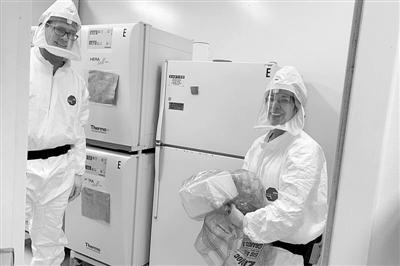How to conduct research during the epidemic? First-line scientists say
Scientists at the John Morrison Laboratory at the California National Primate Research Center are working on site. Image source: "Nature" website
International epidemic operations
Our reporter Hu Dingkun
At present, the epidemic of New Coronary Pneumonia is still raging around the world, universities in many countries are forced to close, and more and more science and technology workers can only work and teach at home. However, scientific and technological support is urgently needed to fight the epidemic, and the research and development of drugs and vaccines can only be intensified, not relaxed. How can we ensure both the progress of scientific research and the safety of researchers?
A few days ago, the "Nature" website published an article, and four front-line scientists made their own suggestions on how to safely conduct necessary research during the epidemic.
Reduce "labor-intensive" research
John Morrison, director of the California National Primate Research Center at the University of California, Davis (UCD), said that he and his colleagues are not subject to the "home order" because they are working with the University of California Center for Immunization and Infectious Disease COVID-19 (New Coronary Pneumonia) study, they also need to "care" animals. "Protecting people's safety is our highest priority, followed by helping fight the epidemic, while protecting the survival and safety of the primates used for research."
Morrison said that in addition to the new coronary pneumonia research, they did not start any other projects. They decided to prioritize longitudinal research to ensure that the previously collected data is still meaningful. "We require staff to redesign their research to reduce the manpower input by 50%. People work at home, shift their shifts, and are scattered in various laboratories. The challenge is that we have to start a new study of new coronary pneumonia with fewer staff. "
Strengthen communication
The team of Mark Dennison, director of pediatric infectious diseases at Vanderbilt University Medical Center, has participated in the research of SARS and MERS. Currently, he is currently conducting screening experiments for new coronary pneumonia treatment drugs such as redcive and hopes to continue to participate in the development of related vaccines.
Denison said: "Our current work has nothing to do with academic credibility, but rather what we can do for the country and the world. Our work is indispensable. The school allows researchers to continue to work in our laboratories, while those who do not Those who must work need to work at home. "
According to Denison, we work 7 days a week and work very long every day. But we take measures to protect ourselves and each other – we keep in touch and everyone must report any symptoms from earache to runny nose. In order to make everyone more than 2 meters apart, we talked across the hall of the laboratory, or held a video conference through Zoom.
continue working
Duke-Vijayan, associate dean of safety and emergency management at the National University of Singapore School of Medicine, said that although it is not easy, it is not impossible to continue laboratory research. They are now taking preventive measures to ensure that their work continues, and major changes in work and lifestyle are a kind of "collective sacrifice", but this is essential to fight this epidemic.
Vijayan introduced: "We have reduced the working hours of researchers because fatigue is very unsafe. We want to ensure that people have time to rest and replenish water. At the same time, we have reduced the number of staff by 40% -50% and reduced it Divide into groups, divided into morning and evening shifts in the Level 3 Biosafety Laboratory (BSL-3), other laboratories are based on how many days a week they work (eg Monday to Wednesday, Thursday and Friday) or work floor Divide.
Vijayan explained that in this way, if one group is isolated, another group can take over the work. Each group wears stickers of different colors, and they can easily avoid sharing elevators or queuing with restaurants at other restaurants.
Ethical guidelines
Shyuan Ngo, a researcher in the field of Alzheimer's disease at the University of Queensland in Australia, said that the head of the research team was required to develop an emergency plan to reduce the number of laboratory personnel. They stopped clinical research because the study participants faced the threat of new coronary pneumonia. They also stopped the projects that started in January, and instead focused on the projects that were nearing completion.
Shyuan Ngo pointed out: “It is unethical to kill animals that have been collaborating for nearly a year. Similarly, we must ensure that all necessary data can be obtained from the stem cells of patients because they have invested time and energy in this project. In addition, the research was funded by funds donated by the public, which is another reason not to close it. "
Shyuan Ngo introduced that for safety reasons, they divided the laboratory into two groups-animal group and stem cell group, each group consisting of 4 people. In each group, they will take turns to arrange work, leaving a 30-minute interval between each class, so that people will not cross in the laboratory.

